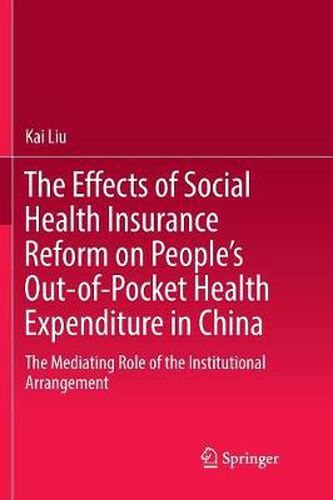Readings Newsletter
Become a Readings Member to make your shopping experience even easier.
Sign in or sign up for free!
You’re not far away from qualifying for FREE standard shipping within Australia
You’ve qualified for FREE standard shipping within Australia
The cart is loading…






This title is printed to order. This book may have been self-published. If so, we cannot guarantee the quality of the content. In the main most books will have gone through the editing process however some may not. We therefore suggest that you be aware of this before ordering this book. If in doubt check either the author or publisher’s details as we are unable to accept any returns unless they are faulty. Please contact us if you have any questions.
This study examines and explains the relationship between social health insurance (SHI) participation and out-of-pocket expenditures (OOP) as well as the mediating role the institutional arrangement of SHI plays in this relationship in China. Embracing a new institutionalist approach, it develops two analytical perspectives: determination, which identifies the mechanisms of social health insurance, and strategic interaction, which explores the interaction among social health insurance agencies, healthcare providers, patients, and institutions. It reveals the poor performance of social health insurance in decreasing out-of-pocket health expenditures caused by a trade-off between the reimbursement, behavior management, and purchasing mechanisms of social health insurance programs. Further, it finds that the inequitable allocation of healthcare resources and patients’ concerns regarding the benefits offset the strategies used by social health insurance agencies to manage care-seeking behavior. It also discovers that the complex interactions between insurance agencies, doctors, patients and a larger disenabling institutional surrounding restricts the purchasing efficiency of social health insurance. This book is characterized by its unique synthesis of the role of the institutional arrangement of social health insurance in China, the interaction between the stakeholders in health sectors, and of the relationship between healthcare institutions, actors, and policy outcomes. Providing a comprehensive overview, it enables scholars and graduate students to understand the ongoing process of social health insurance reform as well as the dynamics of health cost inflation in China. It also benefits policymakers by recommending a single-payer model based on an evidence-based investigation.
$9.00 standard shipping within Australia
FREE standard shipping within Australia for orders over $100.00
Express & International shipping calculated at checkout
This title is printed to order. This book may have been self-published. If so, we cannot guarantee the quality of the content. In the main most books will have gone through the editing process however some may not. We therefore suggest that you be aware of this before ordering this book. If in doubt check either the author or publisher’s details as we are unable to accept any returns unless they are faulty. Please contact us if you have any questions.
This study examines and explains the relationship between social health insurance (SHI) participation and out-of-pocket expenditures (OOP) as well as the mediating role the institutional arrangement of SHI plays in this relationship in China. Embracing a new institutionalist approach, it develops two analytical perspectives: determination, which identifies the mechanisms of social health insurance, and strategic interaction, which explores the interaction among social health insurance agencies, healthcare providers, patients, and institutions. It reveals the poor performance of social health insurance in decreasing out-of-pocket health expenditures caused by a trade-off between the reimbursement, behavior management, and purchasing mechanisms of social health insurance programs. Further, it finds that the inequitable allocation of healthcare resources and patients’ concerns regarding the benefits offset the strategies used by social health insurance agencies to manage care-seeking behavior. It also discovers that the complex interactions between insurance agencies, doctors, patients and a larger disenabling institutional surrounding restricts the purchasing efficiency of social health insurance. This book is characterized by its unique synthesis of the role of the institutional arrangement of social health insurance in China, the interaction between the stakeholders in health sectors, and of the relationship between healthcare institutions, actors, and policy outcomes. Providing a comprehensive overview, it enables scholars and graduate students to understand the ongoing process of social health insurance reform as well as the dynamics of health cost inflation in China. It also benefits policymakers by recommending a single-payer model based on an evidence-based investigation.